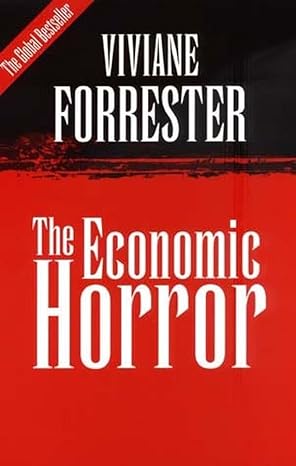
Timeless Reads: Book Review
Viviane Forrester’s The Economic Horror is a powerful critique of modern capitalism that questions society’s obsession with work and productivity. First published in the 1990s, the book remains strikingly relevant in today’s era of automation, gig economies, and jobless growth — exposing how economic systems devalue human dignity and turn unemployment into a moral stigma.
By Newswriters Editorial Desk
Viviane Forrester’s The Economic Horror is a passionate, unsettling, and enduring critique of late-capitalist societies that measure human worth by economic productivity. First published in France in 1996 (as L’Horreur Économique), the book quickly became a touchstone for those disillusioned with the social and moral consequences of globalisation and market-driven reform. Nearly three decades later, its arguments remain strikingly relevant.
Forrester’s central thesis is both simple and devastating: the modern economy has created an illusion of full employment while rendering vast sections of the population “superfluous.” Work, once seen as a means of livelihood and dignity, has become a moral obligation — the yardstick by which one’s social value is judged. In this new order, those without jobs are treated not as victims of structural failure but as moral delinquents. “The unemployed,” she writes, “are the guilty ones of a society that needs them to be unemployed.”
The book’s power lies not in economic statistics or theoretical models, but in its moral and emotional clarity. Forrester writes less as an economist and more as a humanist philosopher, dissecting how neoliberal capitalism has severed work from worth. She exposes the hypocrisy of governments and corporations that continue to speak of “job creation” while restructuring labour markets to ensure cheap, disposable, and precarious employment.
What makes The Economic Horror compelling is its insistence that this crisis is not merely economic but existential. When entire populations are excluded from meaningful work, societies risk collapsing into cynicism, resentment, and alienation. Forrester’s anger is directed as much at the complacent middle class — content to ignore the suffering of others — as at policymakers who perpetuate this inequity in the name of “efficiency.”
Critics have noted that the book offers few practical solutions. It does not provide a roadmap for reform or a policy agenda. Yet that absence is part of its design. Forrester’s aim is to awaken moral awareness, to expose the cruelty of a system that no longer serves people but demands their obedience. Her prose, translated from French, is occasionally lyrical, often polemical, and always urgent — reminiscent of Camus or Simone Weil more than Keynes or Marx.
Relevance in the Present Scenario
In today’s world, Forrester’s warnings sound prophetic. Automation, artificial intelligence, and digital platforms have intensified the very dynamics she described. The gig economy glorifies “flexibility” while institutionalising insecurity. Millions perform essential but undervalued work without stability or benefits. The pandemic further exposed how fragile the link between labour and livelihood has become — how quickly “essential workers” can turn into expendable ones once the crisis ends.
Debates around “universal basic income,” “jobless growth,” and “quiet quitting” echo Forrester’s call to decouple dignity from employment. Her critique also resonates in the Global South, including India, where technological change and informalisation have created a similar paradox: high growth alongside persistent joblessness.
Ultimately, The Economic Horror remains less a historical document than a moral mirror. It forces us to confront uncomfortable questions: What happens when societies no longer need all their people to work? Can we imagine value, identity, and purpose outside the wage system? Forrester offers no easy answers, but her challenge endures — as urgent, humane, and haunting as ever.
Viviane Forrester (1925–2013) was a French writer, essayist, and cultural critic, known for her incisive analyses of literature, art, and society. She contributed to prominent publications including Le Monde, serving as a cultural columnist. Forrester wrote novels, biographies, and essays, winning the Prix Femina for her Van Gogh biography. Her acclaimed essay L’Horreur Économique (The Economic Horror) critiques the human cost of neoliberal capitalism and unemployment. A founding member of the anti-globalization movement ATTAC, she remained an influential voice in French intellectual circles until her death in 2013.



